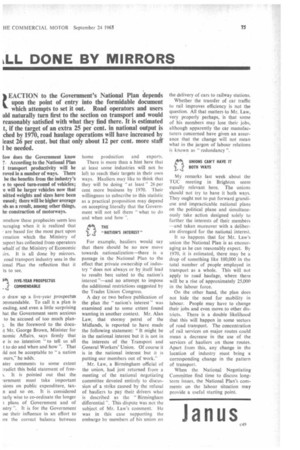LLL DONE BY MIRRORS
Page 77

If you've noticed an error in this article please click here to report it so we can fix it.
tEACTION to the Government's National Plan depends upon the point of entry into the formidable document which attempts to set it out. Road operators and users aid naturally turn first to the section on transport and would reasonably satisfied with what they find there. It is estimated t, if the target of an extra 25 per cent. in national output is ched by 1970, road haulage operations will have increased by least 26 per cent. but that only about 12 per cent. more staff I be needed.
[ow does the Government know ?. According to the National Plan transport productivity will be roved in a number of ways. There be the benefits from the industry's e to speed turn-round of vehicles; e will be larger vehicles now that nitted weights and sizes have been eased; there will be higher average ds as a result, among other things, he construction of motorways. 3mehow these prophecies seem less )uraging when it is realized that are based for the most part upon rmation which the Ministry of isport has collected from operators whalf of the Ministry of Economic .irs. It is all done by mirrors. road transport industry sees in the ional Plan the reflection that it ts to see,
FIVE-YEAR PROSPECTUS COMMENDABLE
o draw up a five-year prospectus arnmendable. To call it a plan is eading, and even a little surprising at the Government seem anxious to be accused of too much plan'
. in the foreword to the docu,
,t Mr. George Brown, Minister for nomic Affairs, says firmly that
e is no intention " to tell us all t to do and when and how ". That id not be acceptable to "a nation ours," he adds.
ater comments to some extent tradict this bold statement of free'. It is pointed out that the rernment must take important sions on public expenditure, tax n and so on. It is considered !arty wise to co-ordinate the longer 1. plans of Government and of istry ". It is for the Government Ise their influence in an effort to Ire the correct balance between home production and exports.
There is more than a hint here that at least some industries will not be left to reach their targets in their own ways. Hauliers may like to think that they will be doing "at least " 26 per cent more business by 1970, Their willingness to subscribe to this statistic as a practical proposition may depend on accepting literally that the Government will not tell them " what to do and when and how ".
THE "NATION'S INTEREST"
For e?tample, hauliers would say that there should be no new move towards nationalization—there is a passage in the National Plan to the effect that private ownership of industry "does not always or by ,itself lead to results best suited to the nation's interest "—and no attempt to impose the additional restrictions suggested by the Trades Union Congress.
A day or two before publication of the plan the "nation's interest" was examined and to some extent found wanting in another context. Mr. Alan Law, that stormy petrel of the Midlands, is reported to have made the following statement: " It might be in the national interest but it is not in the interests of the Transport and General Workers' Union. Of course it is in the national interest but it is putting our members out of work."
Mr. Law, a Birmingham official of the union, had just returned from a. meeting of the national negotiating committee devoted entirely to discussion of a strike caused by the refusal of hauliers to pay their drivers what is described as the " Birmingham differential ". This dispute was not the subject. of Mr. Law's comment. He was in this case supporting the embargo by members of his union on
the delivery of cars to railway stations.
Whether the transfer of car traffic to rail improves efficiency is not the question. All that matters to Mr. Law, very properly perhaps, is that some of his members may lose their jobs, although apparently the car manufacturers concerned have given an assurance that the change will not mean what in the jargon of labour relations is known as "redundancy ".
CalUNIONS CAN'r HAVE IT BOTH WAYS
My remarks last week about the TUC meeting in Brighton seem equally relevant here. The unions should not try to have it both ways. They ought not to put forward grandiose and impracticable national plans on the political plane and simultaneously take action designed solely to further the interests of their members —and taken moreover with a deliberate disregard for the national interest.
It so happens that for Mr. Law's union the National Plan is as encouraging as he can reasonably expect. By 1970, it is estimated, there may be a drop of something like 100,000 in the total number of people employed in transport as a whole. This will not apply to road haulage, where there will be a rise of approximately 25,000 in the labour force.
On the other hand, the plan does not hide the need for mobility in labour. People may have to change their jobs and even move to other districts. There is a double likelihood that this will happen in some sectors of road transport. The concentration of rail services on major routes could mean a decrease in the use of the services of hauliers on those routes. Apart from this, any change in the location of industry must bring a corresponding change in the pattern of transport.
When the National Negotiating Committee find time to discuss longterm issues, the National Plan's comments on the labour situation may provide a useful starting point.
Janus
























































































































